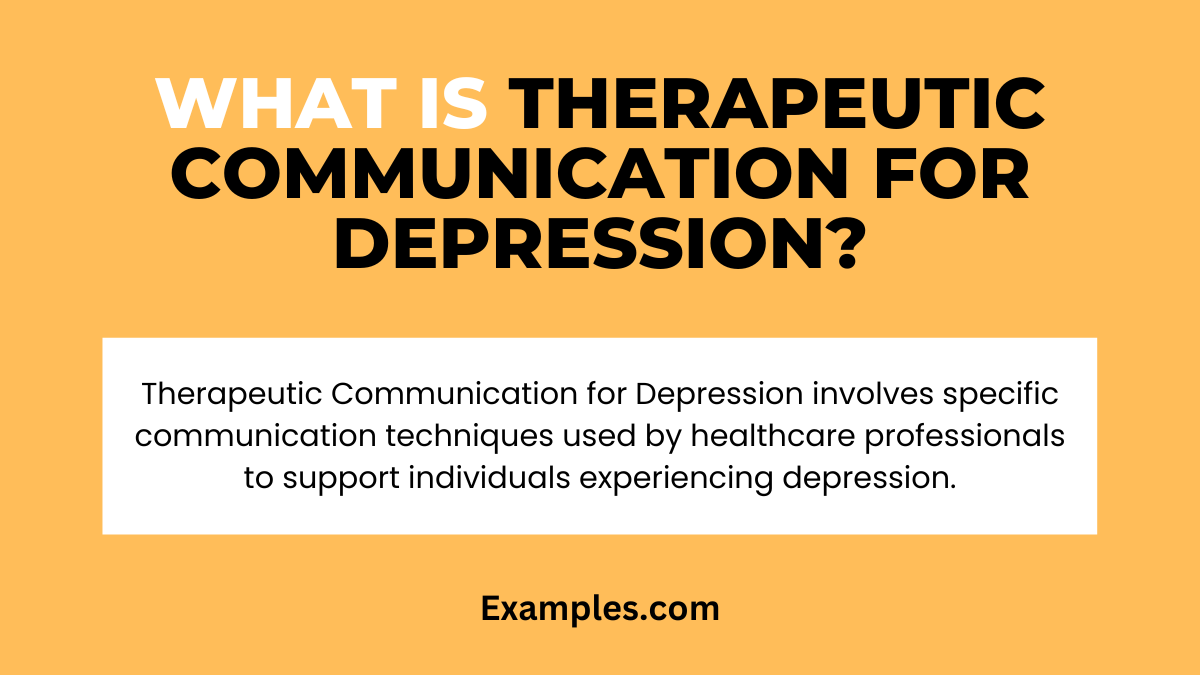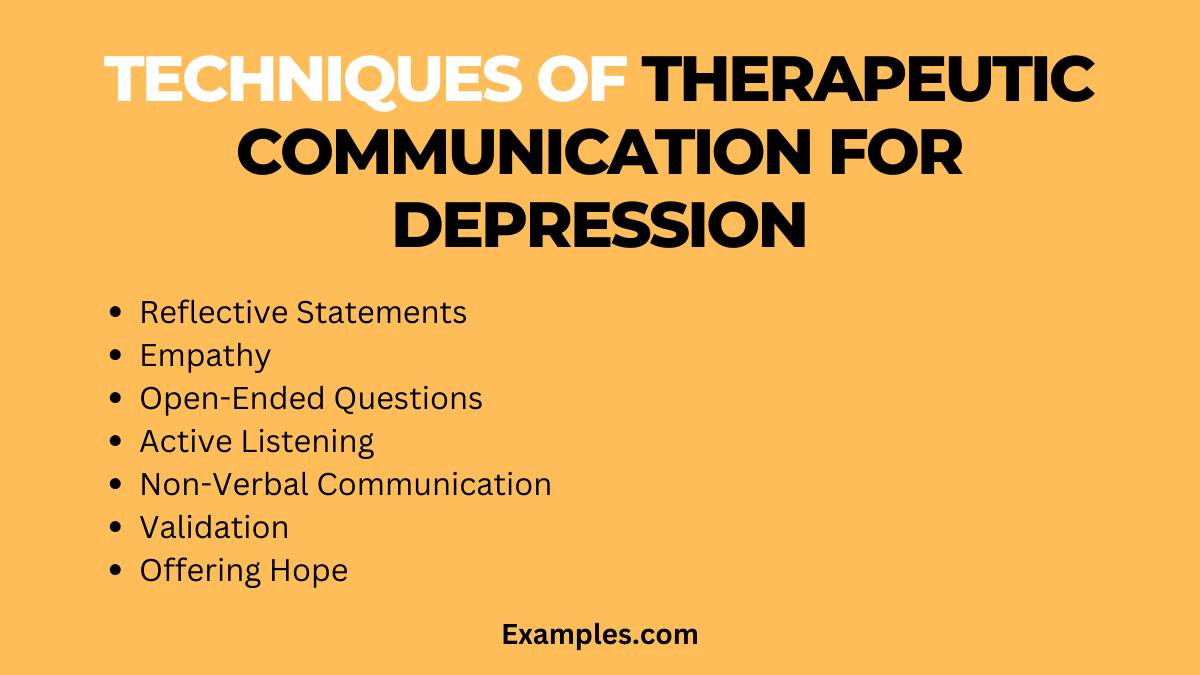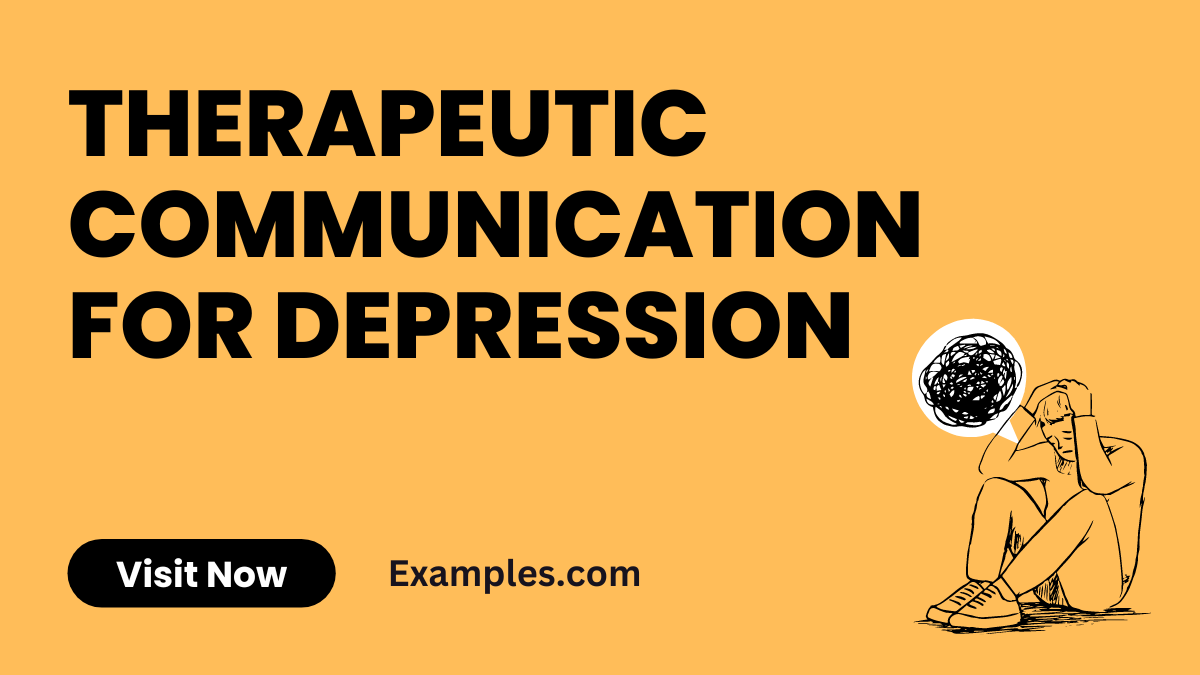10 Therapeutic Communication for Depression Examples
What is Therapeutic Communication for Depression?

Therapeutic Communication for Depression involves specific communication techniques used by healthcare professionals to support individuals experiencing depression. This approach is characterized by empathy, active listening, and non-judgmental interactions. It focuses on understanding the patient’s feelings and experiences, providing a safe space for them to express themselves. Effective therapeutic communication helps build trust, facilitates the healing process, and empowers individuals to discuss their mental health openly. It’s a cornerstone in treating depression, enhancing the patient’s sense of being heard and understood.
Therapeutic Communication for Depression in Nursing Examples
Therapeutic communication in nursing, especially for depression, plays a vital role in patient care. It involves using empathy, active listening, and supportive statements to provide psychological comfort and understanding. This approach not only aids in the emotional well-being of patients but also fosters trust and strengthens the nurse-patient relationship.
- Empathetic Response: A nurse showing genuine concern and understanding towards a patient’s feelings, helping them feel heard and valued.
- Active Listening: Carefully listening to a patient’s concerns without interrupting, indicating full attention and understanding.
- Encouraging Expression: Nurses asking open-ended questions to encourage patients to talk about their feelings and thoughts.
- Positive Reinforcement: Offering words of encouragement and positivity to uplift the patient’s mood and self-esteem.
- Validating Feelings: Acknowledging and validating the patient’s emotions, which can be therapeutic for those experiencing depression.
- Educational Support: Providing information about depression and coping mechanisms, helping patients understand their condition better.
- Non-Verbal Cues: Utilizing body language, like nodding and maintaining eye contact, to show attentiveness and care.
- Offering Hope: Conveying a sense of optimism about the future and recovery, which can be comforting to a patient suffering from depression.
- Setting Boundaries: Establishing clear boundaries to maintain a professional yet compassionate nurse-patient relationship.
- Follow-Up Questions: Asking follow-up questions to show continued interest and engagement in the patient’s well-being.
What are the Therapeutic Communication Techniques for Depression?

Therapeutic communication for depression encompasses a range of techniques aimed at providing support and understanding to individuals dealing with depression. These techniques facilitate a positive therapist-patient relationship, essential for effective mental health care.
Active Listening
Active listening is crucial in therapeutic communication. It involves attentively listening to the patient without judgment, ensuring they feel heard and validated.
Empathy
Empathy involves understanding and sharing the feelings of the patient. It helps in building trust and a strong therapeutic alliance.
Open-Ended Questions
Using open-ended questions encourages patients to express their thoughts and feelings more freely, providing deeper insights into their experiences.
Reflective Statements
Reflective statements involve repeating or paraphrasing what the patient has said to confirm understanding and encourage further conversation.
Non-Verbal Communication
Non-verbal cues like nodding, maintaining appropriate eye contact, and an open body posture can significantly enhance the communication process.
Validation
Acknowledging and validating the patient’s feelings and experiences is essential, as it helps them feel respected and understood.
Offering Hope
Providing a sense of hope can be beneficial for patients with depression. It involves highlighting the possibilities of coping and recovery.
Implementing these techniques effectively requires skill, sensitivity, and a thorough understanding of the patient’s unique needs and experiences.
How to Communicate with a Depressed Person in Therapeutic Communication?
Therapeutic communication is a key tool in supporting individuals dealing with depression. It involves using specific strategies to encourage patients to express their feelings and thoughts, which can be crucial in their healing journey. In this comprehensive guide, we’ll explore the effective ways to communicate with someone who is depressed.
Understanding Depression
Before diving into communication techniques, it’s essential to have a basic understanding of depression. Depression is more than just sadness; it’s a complex mental health condition that affects a person’s emotions, thoughts, and behaviors. Recognizing the signs of depression can help in tailoring your communication approach.
Active Listening
Active listening is fundamental in therapeutic communication. It involves being fully present and attentive to what the depressed person is saying, without judgment. This practice shows that you value their feelings and are willing to understand their perspective.
Providing Emotional Support
Emotional support is crucial when dealing with a depressed person. Offering empathy and understanding can make a significant difference. It’s important to validate their feelings and let them know that it’s okay to feel the way they do. This kind of support can create a safe space for them to open up.
Encouraging Expression
Encourage the individual to express their thoughts and feelings. Sometimes, a depressed person might struggle to articulate their emotions. Gentle prompts and open-ended questions can help them to share more about their experiences. This process aids in unburdening their emotional load.
Using Positive Language
When communicating with someone who is depressed, the choice of words is key. Use positive and hopeful language, avoiding phrases that might sound dismissive of their feelings. Phrases like “I believe in you” or “You’re not alone in this” can be empowering.
Being Patient and Non-Judgmental
Patience is a virtue in therapeutic communication. Understand that healing from depression takes time and everyone’s journey is unique. Being non-judgmental and patient demonstrates your commitment to their well-being.
Offering Practical Help
Sometimes, offering practical help can be more effective than words. It could be as simple as helping with daily tasks or accompanying them to therapy sessions. This kind of support can alleviate some of the pressures they might be facing.
Maintaining Consistency
Consistency in your communication and support is crucial. Regular check-ins and a steady presence can provide a sense of stability and security, which is often needed by those battling depression.
Encouraging Professional Help
While therapeutic communication is beneficial, it’s also important to encourage seeking professional help. Mental health professionals can provide specialized care and treatment necessary for dealing with depression.
Therapeutic communication with someone who is depressed requires empathy, patience, and understanding. By employing these techniques, you can provide significant support and potentially aid in their journey towards recovery.
Tips for Effective Therapeutic Communication for Depression
Depression, a prevalent mental health condition, calls for sensitive and effective communication strategies. Therapeutic communication, when tailored to support individuals with depression, can significantly aid in their healing process. Here are key tips to consider:
1. Active Listening:
Actively listening to a person with depression shows empathy and understanding. It involves paying close attention, nodding, and occasionally paraphrasing to confirm understanding.
2. Non-Judgmental Approach:
Using a non-judgmental approach ensures the individual feels safe and valued. It’s crucial to avoid criticism and offer unconditional support.
3. Encouraging Expression:
Encourage the person to express their feelings and thoughts. This can help in understanding their emotional state and tailoring your communication accordingly.
4. Offering Hope:
Instilling hope can be transformative. Highlight progress, however small, and reassure them that their feelings are temporary and manageable.
5. Validating Feelings:
Acknowledging and validating their feelings helps in building trust. Saying things like “Your feelings are understandable” can make a significant difference.
6. Setting Realistic Goals:
Help them set achievable goals to foster a sense of accomplishment. This can gradually improve their self-esteem and outlook towards life.
In conclusion, therapeutic communication plays a vital role in addressing depression and promoting mental well-being. By implementing the techniques and principles discussed in this article, individuals can establish a strong foundation for effective communication with those experiencing depression. Remember the importance of active listening, empathy, and maintaining a supportive environment. These strategies can lead to more meaningful interactions and contribute to the recovery process of individuals battling depression.
For further resources and information on mental health and therapeutic communication, we recommend exploring authoritative websites and resources from high-quality sources. These resources provide in-depth insights into depression, therapeutic communication techniques, and additional support for individuals and caregivers seeking guidance in managing this challenging condition. Remember that seeking professional help and utilizing trusted resources are essential steps in the journey toward understanding and assisting those affected by depression.



